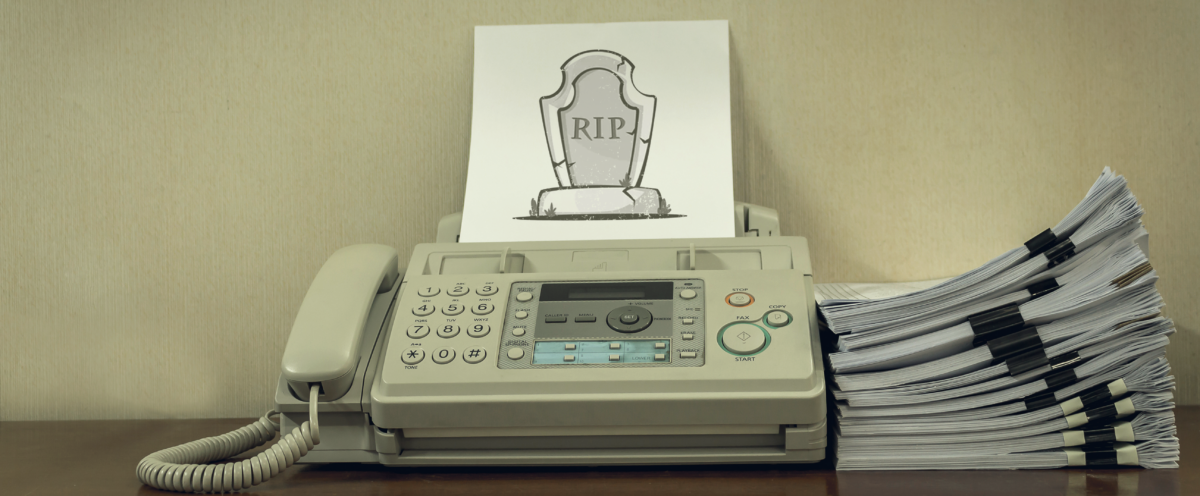
Adobe Stock image illustrated by Cecilia Lopez | The fax machine, a technology whose concept dates back nearly 200 years, is finally going out of style. Or is it?
Written by Ben Hensley
The advent of the nationwide interstate system brought with it the death of the horse-drawn buggy, the Pony Express and introduced widespread transportation innovation throughout the country.
The invention and evolution of air travel in the 20th century largely contributed to the decline of passenger ocean liners, with customers opting for the more efficient, time and effort-saving option of air travel.
The blossoming of new technology has the potential to impact many industries that have long-been tied to familiar names, services and products.
One of these technologies — the fax machine — has seemingly been on its way out of mainstream service since the mid 2000s and the continued development of the internet and wireless communications.
Or has it?
Fax machine’s hey day
The traditional fax machine, believe it or not, traces its roots back to the mid-19th century, when Alexander Bain began experimenting with the concept in 1842. Predating technologies that we consider outdated today — landline telephones, radio communications and other now “outdated” technologies — Bain’s tinkerings birthed ideas still used today: the transfer of data over long distances through technology.
Bain’s invention didn’t see a large-scale explosion until the 1980s, when fax machines littered seemingly every corporate and non-corporate office in the country, cementing its place as a tested and reliable means of communication that, in many ways, mirrored the concepts of email and data transfer that has moved largely online.
Despite the machine itself becoming largely antiquated, California Business Machines president Teri Brymer said that they still carry fax machines and have customers who use them.
Sales of machines now, however, are often focused on industry.
“Certainly there’s been a decline in the need for fax [machines] because of other technology,” she said. “We’re in the electronic age where everything is connected now, but…most offices are still not wanting to be totally faxless.”
Brymer said that while many industries have strayed away from the traditional fax machine, some industries still use them to some degree, including health care offices and some law firms.
“It’s certainly on the down-trend,” she said. “I’ve been around long enough here that I remember when we were being asked to take on fax.”
In an example of the circle of life in the tech industry, Brymer said that when she first started at California Business Machines, there wasn’t much interest in fax machines; the 80s, however, brought with it a massive surge in the technology, driving the need for California Business Machines and other office-equipment distributors to dedicate entire departments to fax machine sales.
Clinging to fax?
One industry that still utilizes fax machines to a larger extent than most is the health care industry, specifically through prescriptions processed by general practitioners and coinciding pharmacies.
MyMed Pharmacy, a compounding pharmacy in North Fresno, still utilizes fax machines to complete prescriptions. Co-owner Ria Jana said the pharmacy receives 20 to 30 faxes per day.
“It varies. We get a lot of faxes depending on the type of doctors we have and how they sent the prescriptions,” she said. “Most prescriptions are sent electronically.”
Jana added that compounding pharmacies often receive prescriptions that are more complicated than standard prescriptions, and often, faxed documents don’t give the entire story, prompting the pharmacist to reach out to the doctor for confirmation.
The opportunity to receive prescriptions via fax — specifically for compound prescriptions — speeds things along when the pharmacy does need to reach out to the doctor’s office.
“We receive a lot [of prescriptions] like that,” she said. Afterwards we would call their office just to verify stuff if we need to, but at least we get the rest of the demographics and background information and, more or less, what they need.”
Other businesses, like law firms, have found alternatives to fax machines. While some companies still utilize traditional fax machines, many, including McCormick Barstow in Fresno, have transitioned to electronic and web-based versions of fax machines.
McCormick Barstow facilities manager James Taylor said that through e-faxes, they are able to log data, something that traditional fax machines lacked the capacity to do.
“A fax machine — you didn’t really have that unless you kept a manual log of some sort,” he said.
From antiquated to antiques
Brymer said that while many modern full-size printers and copiers do not come with fax machines included, many do offer attachments that allow the add-on of a fax machine option.
However, Brymer said that she believes fax machines will largely become obsolete in the coming years.
Brymer added that she still has a fax machine in her office but said that often when it lights up, it’s for an advertisement or spam letter.
Will there be a market for fax machines in the future? While Brymer is not certain, she did mention that California Business Machines occasionally does one-off sales of unique items that many would not consider.
“I can see it being totally gone but we still sell typewriters occasionally,” Brymer said. “Some people do hold onto their technology.”







